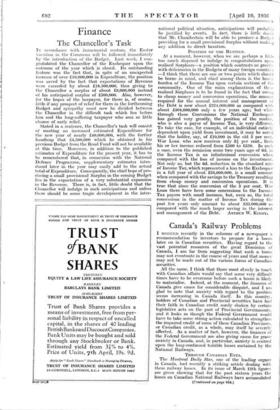The Chancellor's Task
Finance
Ix accordance with immemorial custom, the Easter vacation in the Commons will be followed immediately by the introduction of the Budget. Last week, I con- gratulated the Chancellor of the Exchequer upon the outcome of the year which is closed. Its outstanding feature was the fact that, in spite of an unexpected increase of over £16,000,000 in Expenditure, the position was saved by the fact that expectations of Revenue were exceeded by about £18,500,000, thus giving to the Chancellor a surplus of about £8,000,000 instead of his anticipated surplus of 1500,000. Alas, however, for the hopes of the taxpayer, for there is, of course, little if any prospect of relief for them in the forthcoming Budget and sympathy must now be divided between the Chancellor in the difficult task which lies before him and the long-suffering taxpayer who sees so little chance of early relief. Stated in a sentence, the Chancellor's task will consist of meeting an increased estimated Expenditure for the new year of nearly £40,000,000, with the further handicap that £4,500,000 which he obtained in his previous Budget from the Road Fund will not be available at this time. Moreover, in addition to the published estimates of Expenditure for the present year, it has to be remembered that, in connexion with the National Defence Programme, supplementary estimates intro- duced later in the year may easily add to the actual total of Expenditure. Consequently, the chief hope of pro- ducing a small provisional Surplus in the coming Budget lies in the expectation of a very substantial expansion in the Revenue. There is, in fact, little doubt that the Chancellor will indulge in such anticipations and unless there should be some tragic development in the inter- national political situation, anticipations will probably be justified by events. In fact, there is little doubt that Mr. Chamberlain will be able to produce a Budget providing for a small provisional Surplus without making any addition to direct taxation.
POSITION OF THE REINITIER.
At a moment, however, when we are perhaps a little too much disposed to indulge in congratulations upon realised Surpluses—a position which contrasts so greatly with deficiencies in the Budgets of many foreign countries —I think that there are one or two points which should be borne in mind, and chief among them is the heavy burden of the Income Tax upon certain sections of the community. One of the main explanations of these realised Surpluses is to be found in the fact that owing to cheap money and conversion operations, the amount required for the annual interest and management of the Debt is now about £224,000,000 as compared with about L604,000,000 only a few years ago; but while through these Conversions the National Exchequer has gained very greatly, the position of the renticr, who is also a payer of Income Tax, is very different. To take the case, for example, of an individual entirely dependent upon yield from investment, it may be noted that the holder, say, of £10,000 in the old 5 per cent. War Loan who now receives only 8f per cent., finds his or her income reduced from £500 to £350. In such a case, even the remission some two years ago of 6d. in the Income Tax is an infinitesimal concession when compared with the loss of income on the investment. Not only so, but the 6d. reduction in the standard rate of Income Tax, which represented a loss to the Exchequer in a full year of about £24,000,000, is a small amount when compared with the savings to the Treasury resulting from cheap money and conversion operations. It is true that since the conversion of the 5 per cent. War Loan there have been some concessions to the Income Tax payers with small incomes, but, even so, the total concessions in the matter of Income Tax during the past few years only amount to about £33,000,000 as compared with the much larger saving in the interest and management of the Debt. ARTHUR W. KIDDY.










































 Previous page
Previous page